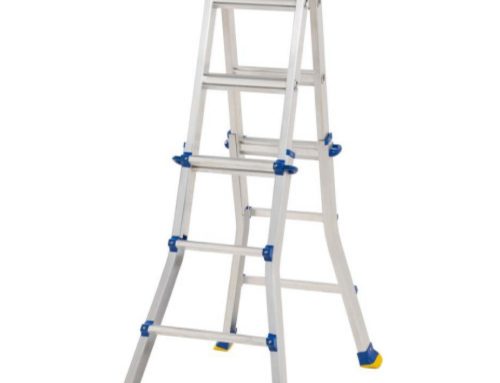This post looks at the word ‘ladder’ and the different ways it is used in non-ladder-related situation. While the origins of the word have already been covered here it is now used to mean several different things. It’s the shape and structure of the ladder, and what it’s used for (climbing!) that has inspired these meanings and phrases.
Meanings
The word ‘ladder’ can be used to refer to
a) an actual, physical ladder;
b) a metaphorical ladder such as ‘the property ladder’, ‘the social ladder’ or ‘the career ladder’, which a person tries to ascend without falling off or being made to climb down;
c) a run in tights or a jumper (because it looks like a ladder) and
d) a sequence of moves in the ancient Chinese game Go, considered one of the more basic attack strategies
Common phrases
Probably the best known of all ladder-related phrases is “getting your foot on the ladderâ€. It’s most often used in relation to advancement within a career, or within the property market. You will hear people say that “it’s hard for young people to get a foot on the property ladder these days†or that they’re proud of a person who is “climbing up the career ladder to managementâ€. Somebody at the top of their field is described as being “at the top of the ladderâ€.
Of course, this can be adapted to refer to people who have lost their homes or been demoted; for example, “they fell off the property ladder†or “he was pushed back down the career ladderâ€. Transferring positions within a company into a different department can be referred to as “moving sideways on the ladderâ€
Similarly, the ladder metaphor can be used to describe the relationship of positions within a hierarchy. Someone working beneath you would be “on the lower rung of the ladder†while a superior would be “on the next rung of the ladderâ€. This is often used within the context of ‘ the social ladder’ where people strive to be the most popular person, or at the very least “on the same rung of the social ladderâ€.
The ladder has also inspired the phrase “can’t see a hole in a ladder†which implies the person this is applied to is either stupid, or drunk (or maybe both). As you know, a ladder has almost as many holes as rungs, so not being able to find a hole in one would cast doubt on a persons’ intelligence or faculties.
A cheeky chat up line for a girl with laddered tights on would be “is that a ladder in your tights, or a stairway to heaven†which is usually met with derision, and it’s doubtful whether many people have actually used this line with any success. If you have, please tell us about it in the comments below!
Proverbs
The ladder has inspired a handful of proverbs. One of them relates to the game Go and the basic ladder attack strategy: “If you don’t know ladders, don’t play Goâ€.
There is a definite theme for a lot of ladder based proverbs; that of the ‘ladder of success’. A simple example is: “He who would climb the ladder must begin at the bottomâ€, which sounds like basic common sense, but it advocates determination and working your way up from the very bottom as the way to get ahead in life.
There is a similar African proverb: “Success is a ladder which cannot be climbed with your hands in your pocketsâ€, also meaning that you need to exert some effort to get ahead in life.
An interesting variation on this theme is the Bulgarian proverb: “Life is a ladder – some will climb up it, others down†which is a more philosophical stance on the notion of hard work getting you up the ladder; it seems to imply that some people will be successful, and others not but nowhere does it suggest that effort or hard work are involved. This is quite similar to an old Gypsy (Roma) proverb which probably originated from the same geographic area: “The world is a ladder, in which some go up and others go downâ€. Variations on this theme can be found all over the world.
Another theme on ladder proverbs goes further into the ‘nice guys finish last’ philosophy, with examples such as: “The one who has helped the others climb the ladder gets kicked in the teethâ€, attributed to Swahili and providing a literal image of the person holding the ladder getting kicked in the teeth by the people climbing it. “On the ladder to success there is always somebody on the rung above you and who uses your head to steady himself†(Icelandic) again creates an image of the person above on the (metaphorical) ladder using those below to further his own success. This theme has even entered sci-fi culture, inspiring the following proverb from Star Trek: “Employees are the rungs on the ladder to success, don’t hesitate to step on them.â€
“He who holds the ladder is as bad as the thief†is a European proverb meaning that people who help criminals are as bad as the criminals themselves. It’s attributed to both Germany and Italy.
“Crosses are ladders that lead to Heaven†is a religious proverb meaning that enduring struggles on your life (i.e. “bearing a crossâ€) will make you virtuous, and see you end up in Heaven. This proverb is widely used in Christian countries.
Other uses of ‘ladder’
The popular board game, ‘Snakes and Ladders’ uses snakes as a trap, or pitfall, meaning the player has to go down the snake (as if they are being eaten) if they land on the snake’s head. Ladders are used as the way to advancement (mirroring the presentation in phrases and proverbs of the ladder being the path to success), so if a player lands on the bottom of a ladder they can then climb up it. Alternative rules to the game involve players also having to descend a ladder if they land on the top if it, which makes it hard to win!
Jacob’s Ladder
The phrase “Jacob’s ladder†comes from a biblical story in which Jacob has a vision of a ladder extending from earth to Heaven, along which angels travel to and from earth. He sees God standing at the top of the ladder and God reassures Jacob that he will be looked after. Some interpretations of this vision in the Bible see this as a connection between Heaven and earth, possibly referring to Jesus. Jesus refers to himself as this ladder in John 1:51.
A ‘Jacob’s ladder’ is also an electrical device that produces sparks continuously. The sparks rise upwards between two wires, producing an effect that looks like the rungs of a ladder as the electrical energy (the spark) between the two wires moves.
‘Jacob’s Ladder’ is also the title of a 1991 film in which Tim Robbins plays the titular character. The ‘ladder’ in the title refers directly to a drug in the film called ‘The Ladder’, said to instigate a descent to man’s base instincts. Jacob’s descent due to ‘The Ladder’ is explored in the film. There is additional significance of the title in the closing scenes, in which the deceased Jacob is led up a staircase and towards a light by his late son. This has been interpreted as a reference to the biblical story.
A ‘Jacob’s Ladder’ is also a traditional toy consisting of wooden blocks laced together with ribbons that creates an optical illusion of the top block descending down the others when the toy is played with.
Funny ladders
Ladders also feature in jokes. Here are a few favourites:
Q. How many lawyers does it take to change a lightbulb?
A. Three. One to climb the ladder, one to shake the ladder and another to sue to ladder company.
Q. Why did the choirboy take a ladder to church?
A. He wanted to reach the high notes.
Q. How do you order a ladder?
A. Call the rung number.
One liner: I fell off a 50ft ladder yesterday. Luckily I was on the bottom rung.






Leave A Comment
You must be logged in to post a comment.